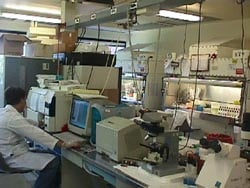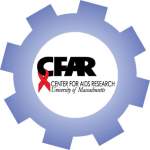Experimental Virology Core

UMass Chan CFAR EXPERIMENTAL VIROLOGY CORE
The Experimental Virology Core [EVC] directed by Dr. Mohan Somasundaran, with support from Co- Director Dr. Paul Clapham, works together with the Translational Medicine and Molecular Biology Cores to provide molecular and virology services to the UMass Chan HIV research community. The aim of the EVC is to bring "cutting edge" HIV virology to UMass Chan researchers, with priority given to CFAR members. Specifically: (1) to facilitate experimental HIV/AIDS research at UMass Chan; (2) to interact with other UMass Chan CFAR cores to provide "cutting edge" reagents and services; and (3) to interact with CFAR Working Groups to identify, optimize and develop new reagents and services for CFAR AIDS researchers.
The Core's clientele are junior and newly recruited HIV-1 investigators, established HIV-1 researchers, HIV-1 clinical researchers, and investigators new to HIV research. Primarily driven by users' needs, and in consultation with UMass Chan CFAR Scientific Working Groups and the other CFAR cores, and with guidance from CFAR Advisory Boards, the EVC ensures that it is optimally prepared to support the evolving needs of UMass Chan CFAR researchers. EVC provides its resources and infrastructure to advance projects related to HIV/AIDS research, and to respond effectivly to the diverse needs of the investigators involved.
SUMMARY OF ROLE
The role of the Experimental Virology Core is to function as a central virus lab facility for UMass Chan HIV/AIDS basic and clinical researchers wroking on independent and collaborative projects. The EVC facility is committed to uphold the mission of UMass Chan CFAR, remaining committed:
1. To provide the most physiologically relevant reagents for "cutting edge" HIV/AIDS research at UMass Chan;
2. To develop and provide the most sensitive and relevant assays required by HIV/AIDS researchers;
3. To provide safe containment laboratory space certified and maintained in compliance with NIH and
CDC guidelines; and
4. To provide training for safe HIV/AIDS research under the appropriate containment.
A few of our service highlights include:
1. 'Clean and safe' biocontainment facilities;
2. Pathogen-specific training;
3. In-house elutriation to provide monocyte-derived macrophages or MDM and matched PBMC;
4. Quantification of viral load using dried blood spot as sample-platform;
5. PCR-amplification of primary HIV-1 env genes;
6. Single genome and amplification or SGA; and
7. Virology assays to phenotype HIV-1 env-mediated cell tropism and entry-kinetics.

